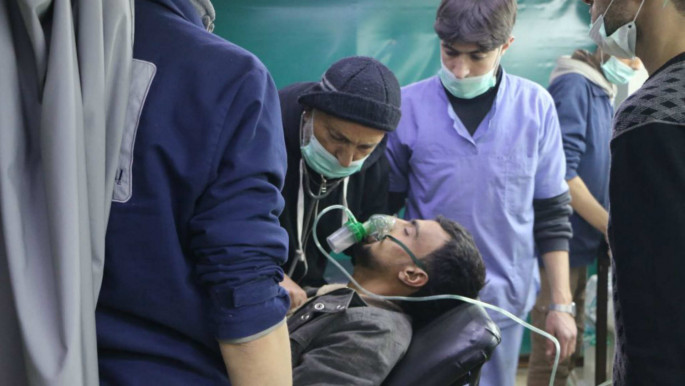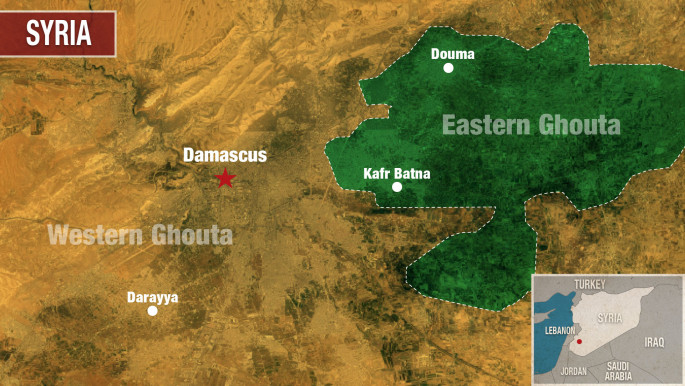
From Syria to the UK: The stark reality of Russia's chemical attacks
Of course, this isn't the first time Russia has attempted to murder dissidents and former spies in the UK. With Alexander Litvinenko, a former FSB (the successor of the KGB) agent and whistleblower against Vladimir Putin and the Russian state, being expertly murdered with the radioactive agent polonium in a London sushi restaurant.
And while it's too early to say if Russia was involved in his death, the Russian exile, dissident and Putin critic Nikolai Glushkov has today been found dead at his home in London.
But the attack in Salisbury - not yet fatal to any of its intended and unintended targets - is on quite a different level.
Unlike using polonium, which is administered more like a traditional poison, posing risk only to the recipient, Russia unleashed a weaponised nerve agent in Salisbury, putting at risk the lives of potentially hundreds of people. Along with Skripal and his daughter who were found and remain in comas, hanging on to life by a thread, three police officers were also hospitalised, with one who had been sent to Skripal's house, in a critical condition.
It's right to say that this was a targeted chemical weapons attack by Russia on British soil, with zero regard for any collateral damage it might've caused.
In her speech to the House of Commons, Theresa May rightfully connected this brazen Russian aggression "took place against the backdrop of well-established pattern of Russian aggression". She went on to cite Russia's annexation of Crimea following the Euromaidan uprising in Ukraine, as well as its "fomenting" of violence in the east of that country, where irregular Russian military forces fight alongside Russian-funded and supporting fascist "rebels".
 |
Russian power is built on the weakness and disunity of its enemies |  |
But there was a gaping hole in May's statement. A Syria-sized chasm, you might say.
Though May has condemned Russian intervention in Syria in the past, she left out what is easily Russia's most egregious act of "state aggression" in the world today, one that is genocidal in its scale and intention.
While world outrage about the current destruction of East Ghouta, perpetrated by Russia on behalf of and in conjunction with Assad, has somewhat dimmed, dozens continue to die every day.
Well over 1,000 Syrians have been murdered in just 20 days, while Russia has overseen and pre-emptively obscured the use of chemical weapons by the Assad regime, as it did when Assad gassed to death thousands at Ghouta and Khan Sheihkhun.
Yet May couldn't find it within herself to connect Russia's brutal domination of Syria with what occurred in Salisbury.
 |
|
| Syrians in Eastern Ghouta suffer another chlorine gas attack carried out by the Russian backed Assad regime, 6 March, 2018 [AFP] |
In a sense, this omission is part of the reason why Salisbury could occur.
Russia's intervention in Syria, which one might say is the 'solid' centre point of its often covert imperialist strategy, relies on the weakness of its alleged geopolitical rivals. It exploits both the caution that democracy usually necessitates when it comes to foreign policy, but also direct appeasement of it and its aims.
The spirit of appeasement is one that reigns supreme when it comes to Russian state aggression. While May might talk about the situation in Ukraine, Russia's violent mobilisation to curtail the self-determination of that country was met with rhetorical condemnation and useless sanctions from the democratic West.
In Syria, the Russian claims of fighting IS, which was a pretext for its genocidal intervention on behalf of Assad against Syrians who revolted against his tyranny, were largely accepted by the world.
 |
|
| Click to enlarge |
Even if there was rhetorical condemnation, nobody has done anything to stop Russian aggression in Syria. If anything, under Obama and now Trump, the US, the vanguard of the West on such matters, has edged closer to Russia.
It was only when IS emerged out of the killing fields of Syria and began to pose a terror threat to the West and its state allies in the region that western intervention in Syria occurred, with coalition warplanes sharing airspace with Russia as the latter deliberately annihilated civilians.
The huge scale of Assad and Russia's crimes was ignored or tacitly accepted, while the focus switched entirely to the less widespread crimes of IS.
Even in the wake of the Khan Sheihkhoun sarin massacre carried out by Assad, the world conceded that Russia was responsible by proxy, but they could not agree to any meaningful response - not even sanctions.
Many of us warned that ignoring Assad-Iran-Russia's genocide in Syria would come back to haunt the world.
Appeasement doesn't work. Turning a blind eye to chemical weapons attacks is to enable this savagery.
Now chemical weapons have been used by Russia in the heart of an English town. Do those who think Syria doesn't matter also think the same when, admittedly but still significantly, only a fraction of the same Russian terror is visited upon Middle England?
 |
The huge scale of Assad and Russia's crimes was ignored or tacitly accepted |  |
It's no coincidence that this attack occurred in the run up to the presidential election in Russia, with Putin making a series of bellicose remarks and displays against the West, appealing to the hardline nationalist base.
Striking at Skripal, a treacherous enemy of Mother Russia living in an enemy state, would be music to their ears.
But, according to historian and Russia expert Amy Knight, it wasn't just intended for a domestic audience. As she wrote in The Daily Beast, Russia's message to the wider world, particularly the US and UK, is "you know we [Russia] did it, and you know and we know you're not going to do anything about it".
With the Trump administration compromised by its own dodgy links and alliances with Putin, including benefitting from Russia's unprecedented cyber assault on the US during the last election, and with May's own party having financial links with various potentially pro-Kremlin sources, one suspects that the response to this will be tame.
May has set a deadline of midnight on Tuesday for Russia to either admit that it was responsible for the attack, or that it has lost control of its chemical weapons stockpile.
I doubt Russia will have lost much sleep.
 |
It's no coincidence that this attack occurred in the run up to the presidential election in Russia |  |
Britain serves as a microcosm for liberal democracies in the face of Russian aggression - a tame centre-right government that is stretched between the nativist alt-right, and the isolationist alt-left.
This dynamic is now playing out across Europe and the West. Pro-Russian authoritarian forces, often with direct links to Putin, are emerging as electoral or even governing forces, while centrists dither.
Karl Marx, of all people, once remarked of Russian aggression against Turkey and Europe, that "the Russian bear is capable of anything, as long as it knows that its enemies are capable of nothing".
Russian power isn't built on its iron will or the unmatchable power of its military and economic strength, but rather the weakness and disunity of its enemies, something Russia has deliberately cultivated.
Only last month, Israel demonstrated this as it destroyed 50 percent of Assad's air defences without kicking off WWIII.
The West could've acted very early on in Syria to, most importantly, avert the current genocide, but also to stop Russia in its tracks.
Contrary to the line of appeasers and apologists for tyranny, the alternative to appeasement isn't necessarily war, but rather decisive action at an early stage to avert a larger war.
Russia's war against Syrians is a war against all of humanity - it might take something even more drastic than a chemical weapons attack in Salisbury to hammer this point home.
Sam Hamad is an independent Scottish-Egyptian activist and writer.
Opinions expressed in this article remain those of the author and do not necessarily represent those of The New Arab, its editorial board or staff.




